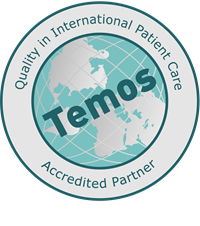Pediatric Allergy Specialist
In the absence or dysfunction of any component of the immune system, or in the case of allergic diseases, these conditions are evaluated in hospitals by the Department of Pediatric Immunology and Allergy.
Our defense system, which protects the body against microorganisms and harmful antigens, consists of various tissues, organs, and molecular elements and is called the “immune system.” The reaction of the immune system to foreign antigens is defined as the “immune response.” When the immune system gives an exaggerated or unnecessary response to antigens that are normally harmless, this condition is referred to as “allergy.”
Pediatric Immunology and Pediatric Allergy Subspecialty
Pediatric Immunology and Pediatric Allergy specialists complete 6 years of medical school education, followed by Specialization in Pediatrics after passing the Medical Specialty Examination (TUS). After 4 years of pediatrics training, they pursue an additional 3 years of fellowship in Pediatric Immunology and Allergy Diseases by passing the Subspecialty Examination (YDUS).
When Should You See a Pediatric Allergy Doctor?
Common childhood conditions include:
- Atopic eczema, allergic rhinitis, allergic asthma, urticaria: Identifying the responsible allergen is essential for successful treatment.
- Food allergy and anaphylaxis: Life-threatening “allergic shock” (anaphylaxis) requires close monitoring.
- Recurrent cough: In children with a history of bronchiolitis, the diagnosis of asthma can be confirmed in this department.
- Eczema treatment: In cases unresponsive to topical therapies, underlying immune deficiency should be investigated.
Situations requiring evaluation for immune deficiency include:
- Frequent ear or respiratory tract infections.
- History of severe infections requiring hospitalization.
- Long-term antibiotic treatments.
- Family history of immune deficiency.
- Delayed separation of the umbilical cord.
- Development of disease after live vaccination.
- Persistent oral thrush.
Referral to unrelated specialties may delay diagnosis and treatment. Therefore, awareness is crucial.
Tests and Examinations in the Pediatric Allergy Department
Tests used in the diagnosis of allergic diseases:
- Skin Prick Test: Allergy skin test.
- Patch Test: Detects skin allergies.
- Specific IgE: Blood allergy test.
- Oral Food Challenge: Used for diagnosing food allergies.
For asthma diagnosis:
- Pulmonary function tests are performed in children over 7 years of age.
- Radiological imaging may be used to rule out non-allergic respiratory conditions.
Immune system evaluation includes:
- Complete blood count, immunoglobulin levels (IgG, IgA, IgM, IgE).
- Assessment of vaccine responses.
- Ultrasound or advanced genetic testing, if necessary.
It should be emphasized that diagnosis is based on physical examination and clinical expertise. Tests are supportive, and accurate evaluation can only be provided by a pediatric allergy specialist.
Treatment Process in Pediatric Immunology and Allergy
The first step in treatment is implementing strategies to avoid the triggering allergen.
- Allergen elimination: Avoiding cigarette smoke, engaging in regular exercise, and staying away from triggering factors are recommended.
Medical treatment is tailored to the patient’s phenotype and the severity of the disease.
- Allergic asthma: Includes allergen elimination, environmental control, medication, and allergen-specific immunotherapy (AIT).
- Allergy Immunotherapy (AIT):
- Modifies disease progression by increasing immune tolerance.
- Usually requires a 3–5 year program with regular follow-up.
What is Immune Deficiency and How is it Treated?
Patients with primary immune deficiency should be followed by specialists in immune system diseases.
Treatment methods include:
- IVIG Replacement: Provides missing antibodies.
- Administered intravenously every 3–4 weeks or subcutaneously.
Severe immune deficiencies:
- Bone Marrow Transplantation (BMT): Involves transplanting healthy stem cells from a donor to the patient.
In some cases, enzyme replacement, gene therapy, and monoclonal antibodies may also be used.
The Pediatric Immunology and Allergy Department specializes in the diagnosis, treatment, and follow-up of allergic and immune system diseases in children. This process improves quality of life and supports healthy growth and development.
